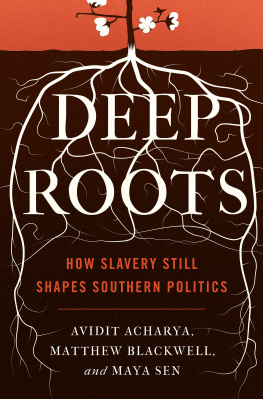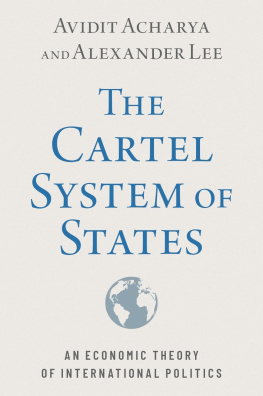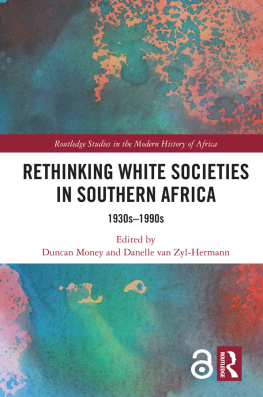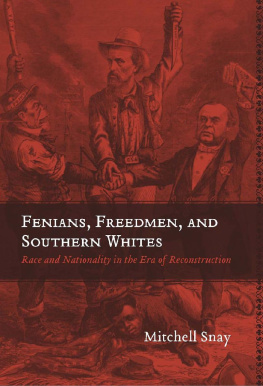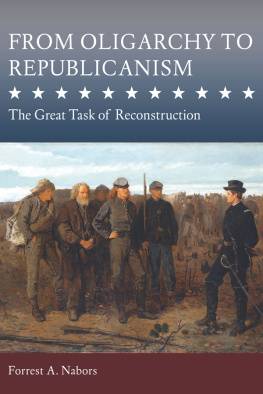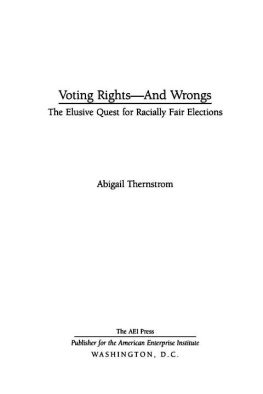
DEEP
ROOTS

Tali Mendelberg, Series Editor
Envy in Politics by Gwyneth H. McClendon
Communisms Shadow: Historical Legacies and Contemporary Political Attitudes by Grigore Pop-Eleches and Joshua A. Tucker
Resolve in International Politics by Joshua D. Kertzer
Democracy for Realists: Why Elections Do Not Produce Responsive Government by Christopher H. Achen and Larry M. Bartels
DEEP
ROOTS
HOW SLAVERY STILL
SHAPES SOUTHERN POLITICS
AVIDIT ACHARYA
MATTHEW BLACKWELL
MAYA SEN
PRINCETON UNIVERSITY PRESS
PRINCETON AND OXFORD
Copyright 2018 by Princeton University Press
Published by Princeton University Press,
41 William Street, Princeton, New Jersey 08540
In the United Kingdom: Princeton University Press,
6 Oxford Street, Woodstock, Oxfordshire OX20 1TR
press.princeton.edu
All Rights Reserved
ISBN 978-0-691-17674-1
Library of Congress Control Number: 2017963019
British Library Cataloging-in-Publication Data is available
This book has been composed in Sabon Next LT Pro, Trade Gothic LT Std and Trajan Pro
Printed on acid-free paper.
Typeset by Nova Techset Pvt Ltd, Bangalore, India
Printed in the United States of America
1 3 5 7 9 10 8 6 4 2
This book is dedicated to
Usha Acharya,
Jayaraj Acharya,
and Hugo Blackwell-Sen
CONTENTS
TABLES
FIGURES
ACKNOWLEDGMENTS
This book unfolded as a series of informal lunchtime conversations while all three of us were assistant professors at the University of Rochesters Political Science Department. Over time, our informal conversations turned to several core themesthemes that we believed characterized some of the most important questions in American politics. Why is the South so reliably conservative? Why have white Southerners been so conservative, particularly on issues related to race and redistribution? Does this make the United States more conservative than other Western democracies? As we continued to debate these ideas, we kept coming back to historical forces. And, motivated by many papers in political economy, we began to explore the connection between contemporary Southern politics and the Souths slave past, gradually bringing in data and developing our argument about the historical persistence of political attitudes.
Several years later, this intellectual journey has culminated in this book. Along the way, we have written several papers and engaged scholarship from across different fields, including political science, history, economics, African American studies, womens studies, sociology, and statistics (to name a few). We have talked with scholars from across substantive and methodological areas. All three of us have moved away from wintry Rochester to three very different departments (two in Cambridge and one in Palo Alto), have grown our families, and rediscovered other research areas. However, our interests keep bringing us back to the idea that contemporary politics is, in part, a function of historical forces and traditions.
Our intellectual trajectory was aided and encouraged by the help of many scholars. We are indebted to many conference, seminar, and workshop participants who listened to early versions of this project and who provided valuable feedback. The questions, criticisms, and comments we received at these presentations helped immeasurably in making this researcher stronger, more nuanced, and more comprehensive. We are especially grateful to conference or seminar participants at the University of California-Berkeley, Columbia, the Harvard Department of Government, the Harvard Kennedy School, the Harvard Law School, the London School of Economics, Princeton, Stanford, the Maxwell School at Syracuse University, CIDE (Mexico City), the University of Kentucky, the University of Notre Dame, the University of Pennsylvania, the University of Pittsburg, the University of California-Riverside, the University of Chicago, the University of Chicago Law School, the University of Washington, the University of Warwick, Washington University-St. Louis, the University of Wisconsin, the University of Virginia, Yale University, and the University of California-San Diego. This list also includes participants at several national academic conferences, including the 2013 Conference on Empirical Legal Studies, the 2014 American Political Science Association Meeting, the 2015 Midwest Political Science Association Meeting, the 2015 European Political Association Meeting, and the 2014 Society for Political Methodology Summer Meeting.
We are also fortunate to have many supportive, thoughtful, and, importantly, critical colleagues with whom we have had ongoing conversations (online or in person) about this project. This list is long and includes scholars from across disciplines, methodological and substantive specialities, and departments, especially those at the Stanford Department of Political Science, the Harvard Department of Government, and the Harvard Kennedy School. We are especially grateful to Jim Alt, Steve Ansolabehere, Larry Bartels, Matt Baum, Adam Berinsky, Lisa Blaydes, Ray Block, Larry Bobo, Adam Bonica, Corey Brettschneider, Christia Spears Brown, David Campbell, John Carey, Dan Carpenter, Amy Catalinac, Charlotte Cavaille, Adam Chilton, Andrew Coe, Cathy Cohen, Dara Kay Cohen, David Darmofal, Lauren Davenport, Andrew Eggers, Stanley Engerman, Ryan Enos, Bernard Fraga, Luis Fraga, Archon Fung, Sean Gailmard, Claudine Gay, Scott Gehlbach, John Gerring, Martin Gilens, Steve Hahn, Morgan Hazelton, Mike Henderson, Michael Herron, Jennifer Hochschild, Vanessa Holden, Dan Hopkins, Will Howell, William Hubbard, Jeff Jenkins, Nathan Kalmoe, Josh Kertzer, Gary King, Morgan Kousser, Chryl Laird, David Laitin, Jennifer Larson, Ben Lauderdale, Alexander Lee, Corrine McConnaughy, Ryan Moore, Suresh Naidu, Nathan Nunn, Brendan Nyhan, Eric Oliver, Orlando Patterson, Mark Peffley, Dianne Pinderhughes, Ellie Powell, Kevin Quinn, Karthick Ramakrishnan, Marc Ratkovic, Andrew Reeves, John Roemer, Thomas Romer, Cyrus Samii, Alex Sarabia, David Sears, Gary Segura, Ken Shepsle, Ken Shotts, Paul Sniderman, Arthur Spirling, Dustin Tingley, Stewart Tolnay, Stephen Voss, Leonard Wantchekon, Matthew Winters, Christina Wolbrecht, and Jon Woon.
We are especially thankful to participants in our book conference: Justin Grimmer, Marc Meredith, Robert Mickey, Eric Schickler, Michael Tesler, and Vesla Weaver. The thoughtful comments, critiques, and suggestions of these scholars helped us immensely in terms of clarifying our thoughts and moving the book project forward. We are extremely grateful for their time and for their investment in this project. In addition, the comments of several anonymous referees helped us sharpen our arguments and shore up empirical analyses. Although we do not know who they are, we are enormously indebted to their feedback and engagement.
We should also add that this book would not have been possible without the welcoming environment toward political economy and rigorous empirical inquiry that is the trademark of the University of Rochester Department of Political Science, where the three of us embarked on this project. For that reason, we are especially indebted to our Rochester colleagues, including Adam Cohon, Stanley Engerman, Gerald Gamm, Robin Harding, Gretchen Helmke, Hein Goemans, Stuart Jordan, Bethany Lacina, Dick Niemi, Michael Peress, Bing Powell, Lynda Powell, Larry Rothenberg, Curt Signorino, and others. Susan Hagen of the University of Rochester media office pressed us on how to make this work resonate with a public audience.
Next page
